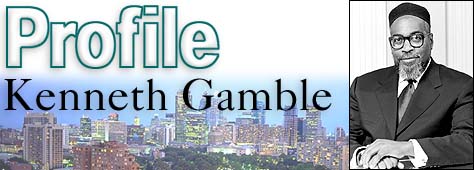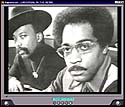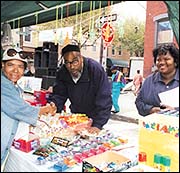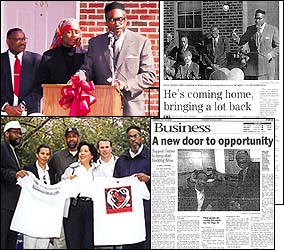

Music Pioneer Rebuilds Lives and Communities
by Thomas G. Whittle
 In the 1960s, a young Philadelphia man embarked on a career in the music industry that would become legendary—one that would, as his own star rose, touch and improve the lives of many, and return to his community the spirit of help and renewal.
In the 1960s, a young Philadelphia man embarked on a career in the music industry that would become legendary—one that would, as his own star rose, touch and improve the lives of many, and return to his community the spirit of help and renewal.
fter leading his own band and founding a record company, he went on to write, produce and record more than 3,000 songs performed by such artists as Archie Bell, The Delfonics, The Intruders, The Jackson Five, The O’Jays, Teddy Pendergrass, Wilson Pickett, The Three Degrees, and many others, resulting in more than 170 platinum and gold albums and songs.
His pivotal contributions to the world of music include creating, with his partner, Leon A. Huff, “the Sound of Philadelphia,” expressing the ideas and feelings of African Americans while delivering a message to everyone to stand up for what is right.

| ||
 |
COMMUNITY RESPONSIBILITY Although he has achieved fortune and worldwide fame, Kenneth Gamble remains connected with his roots, signaling his commitment to rebuild communities by moving from the suburbs back to the South Philadelphia neighborhood where he was born. |
 |
And although he has achieved fortune and worldwide fame, Kenneth Gamble remains connected with his roots, signaling that commitment by moving with his wife in the early 1990s from the affluent suburbs back to the inner city neighborhood in South Philadelphia to help rebuild the community where he was born in 1943.
From Devastation to Renewal
“Many of my songs have a social theme—which came from my heart and represent what I feel,” Gamble said.
One of those was written in 1977, a song entitled “Let’s Clean Up the Ghetto,” inspired “because every day, en route to my downtown office, I would ride through my old neighborhood in South Philadelphia, the place where I was born and raised,” he said. “My neighborhood had become so devastated, just like many other African-American communities all around America.”
“In our urban regions,” he said, “we are developing separate and unequal societies. The disparity between the wealthy and the poor has become disastrous. We see centers of affluence and centers of poverty, centers of excellence and centers of despair. Urban America has become a ‘vacant community’ inhabited by America’s poorest citizens.”
Deciding he had to do something to reverse the trend and improve conditions, he began to purchase run-down houses in the 1970s, beginning with his childhood home.
He believes that one cannot revitalize a community without effective “hands-on” management. And so it was that, after acquiring more than 100 abandoned houses in his old neighborhood, Gamble moved back in with his sleeves rolled up.
As part of his visionary revitalization effort, Gamble founded Universal Companies, a nonprofit organization. Under its umbrella he established a workforce development center offering adult education and job training to anyone at any skill level, a construction company to provide training and jobs, a business support center with resources and technical assistance, and other entities, all aimed at empowering the inner city and its residents.
After also founding a nonprofit community development corporation, Universal Community Homes (UCH), Gamble forged ahead with his efforts to provide low- and moderate-income families in Philadelphia with freshly built or refurbished homes at affordable prices.
In 2000, in recognition of the more than 120 homes constructed or renovated by UCH, and the more than 70,000 square feet of commercial space it developed to support local needs, UCH earned the Beacon Community Award from First Union Corp., presented for programs that build and strengthen neighborhoods.
|
“To rebuild a community,” Gamble noted, “in addition to the housing you have to rebuild the people, because the people are the community.... And if the people in the community are not restored, then restoring the houses and everything else doesn’t mean anything.”
Hence, redevelopment plans include—in addition to building over 540 more homes—such items as restoration of the historic Royal Theater. Built in 1919, the Royal once hosted performances by Pearl Bailey, Bessie Smith and countless other stars.
In all aspects of community restoration, the emphasis insisted upon by Gamble is to truly help those who live there so they can remain—and not to force people out by driving up property costs. His strategy is to ensure that the people in the community participate in the wealth generated by the improvements.

| ||
 |
REVITALIZING NEIGHBORHOODS As part of his visionary effort, Kenneth Gamble founded the nonprofit Universal Companies and under its umbrella established a workforce development center, a construction company to provide training and jobs, a business support center, a charter school and other entities—all aimed at empowering the inner city and its residents. The community revitalization programs Gamble launched and nurtured have created hundreds of jobs, with many more lined up for the future. |
 |
One of the most vital aspects of rebuilding a community is restoring or creating proper educational resources. To help fulfill this need, Universal Companies planned, designed and today operates the Universal Institute Charter School, hailed as one of the most successful charter schools in the nation, with some 400 students and a waiting list of 1,400 more.
Speaking before the U.S. House of Representatives on September 28, 2000, Rep. Jack Kingston (R-Georgia) commended the school, describing it as “something that all the neighborhood and the community can focus on and take a lot of pride in.”
Noting the school’s emphasis on input from teachers and parents, he praised the institution as an example of local initiative needed “to get people back home interested and involved in the education process, because our children and our future are at stake.”
Rep. Kingston applauded Gamble for his successful efforts in rebuilding South Philadelphia, referring to him as “a one-man urban renewal project” and concluding by saying, “We should all follow Mr. Gamble’s lead.”
Hope and Self-Respect
The beneficial impact of the programs Kenneth Gamble launched and nurtured have been recognized by, among others, the Philadelphia City Council, which in April 2000 presented him with a special award. At the ceremony, Councilman Frank DiCicco praised him as one of the few who actually “put their money where their mouth is.”
In South Philadelphia, one man’s dream has opened bright vistas in the futures of thousands.
“Close your eyes for a minute,” Gamble says, asking one to envision how the inner city should be. He then presents his own picture, one which each day he pushes closer to reality: “Streets that are safe, children who have access to education, people who have access to health, mental health and also physical health, jobs. And most of all, people who have hope and self-respect.”

